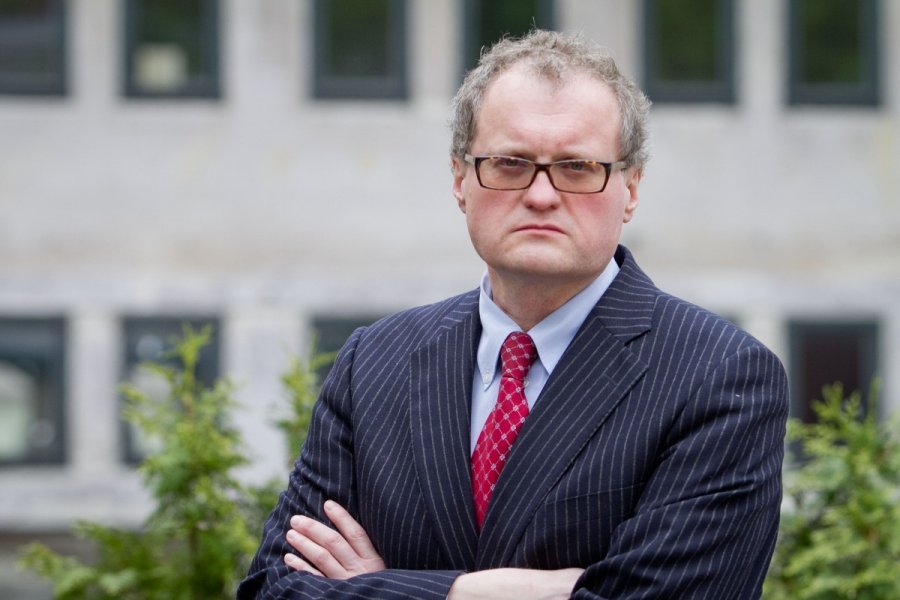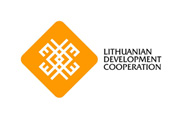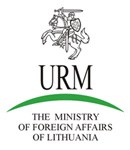Democracy and Revenge
Clarion Dialogue with Dr. Leonidas Donskis

The Clarion: For the first time in its 25 years of independence, the governing party in Georgia has moved to opposition, rather than disappearing. Still, some citizens and politicians openly wish its final demise. Ghia Nodia, a prominent Georgian scholar, once noted that the essence of democratic transition is the victor’s “inability to subdue” the loser.
Do you feel that intolerance towards an opponent is a common post-totalitarian trait? Did or does Lithuania exhibit the symptoms of the same disease? And if so, how were they mitigated?
Dr. Leonidas Donskis: Failing to act in a democratic fashion by trying to eradicate the opposing force does appear to be a post-totalitarian trait.
In the 1990s, some Central European countries have greatly benefitted from such liberal-minded leaders and unquestionable democrats as Václav Havel in the Czech Republic and the former leaders of the Solidarity movement in Poland. Yet we have also witnessed a more sinister trajectory in the same region, which could be traced to the nationalistic populism of Vladimir Mečiar in Slovakia or, even more so, Viktor Orbán in Hungary.
I find it increasingly difficult to draw a sharp dividing line between Central and Eastern Europe in terms of their human rights record and fidelity to liberal, democratic sensibilities.
Viktor Orbán’s regime is soft-version Putinism, a blow to Hungarian democracy. Czech President Miloš Zeman supports Vladimir Putin and blasts the legacy of Václav Havel, saying his policies have been damaging for economy. Although it is true that defending human rights can work against trade agreements and strategic partnerships.
These developments can’t console us, much less inspire hopes for Eastern European democracy.
In a world of intermittent human ties and inflated words and vows, treacherousness no longer shocks. When fidelity ceases to be at the centre of our personality, a force that integrates all of a human being’s identity, then treachery becomes a situational “norm” and even a “virtue.”
What happens to politics then? It becomes a haven for people of situational – or, as Erich Fromm once called it, mobile – truth. It lends itself easily to adventure-seekers, criminals and crooks of various shades. The winner takes it all, just like elsewhere in our increasingly competitive and instrumentalist world. This is a sporting life…
The Clarion: What is the source of European democracy as we see it now? Is it the combat of the irreconcilable forces that have come to embrace democratic institutions as a form of truce? Or is it the value-based judgement that consultative decision making is the most efficient and effective one?
After 11 March 1990 when Lithuania had restored her independence, very few of our public figures dared to hope that Lithuania and two other Baltic nations would be accepted into the European family anytime soon. We were quite sure to qualify for the club someday, but not in the near future.
We understood quite well that we were far from reaching the standards of Western politics and society in terms of economic performance, public wellbeing, human rights record, transparency, and the like. For some years there was little doubt that the logic of democratic politics in Lithuania was impeccable, the elections were free and truly democratic, and the separation of powers was flawless. But stronger proof was needed for the EU that the country has reached the point of no return. It took us some time to grasp this fully.
We knew that pre-war Lithuania was integrated into the Western trade system, but it did not help our security then. The county was left out of the Western security system. We knew that the US and the vast majority of democratic states regarded the Baltic States as brutally occupied and annexed by the USSR. Still, there was an element of sad fatalism about their position– “we all know how awful it was, but what can we do about it?” After achieving our independence, European officials indicated that we had to convince the West that it made sense for them to let us back into Europe. To them, such a prospect was neither easy nor tempting.
Had anybody told me in the early 1990s that Lithuania would become a full member of the EU and NATO in ten years, I would have thought that I was talking to a lunatic. All we dared to hope for was the light at the end of the tunnel – precisely in the same way that Georgia thinks about the potential EU or NATO membership - as the motivation to live and act. Yet it happened much sooner than most Lithuanians and our fellow Balts expected. That was no miracle though.
The point was that the political class of the country consolidated around the big European vision. If there was any miracle behind the story of Lithuania’s accession to the EU and NATO, it was the hundred percent solidarity over the issue of our accession to the EU and membership in NATO. Lithuanian politicians dropped all their misgivings and grievances, their clashing narratives and interpretations of the past, arguing over who was and who was not a genuine patriot in Lithuania under Soviet rule.
The former leader of the Lithuanian Communist Party (then President of Lithuania) Algirdas Mykolas Brazauskas was as enthusiastic about our strategic goals as Vytautas Landsbergis, the hero of Lithuanian independence fight who personally laid the foundations for present-day Lithuania.
It is an unquestionable fact of modern life that democracy has nothing to do with unbridgeable gulfs and irreconcilable polarities. As a system of the separation of powers and of an empowerment of citizens, democracy always benefits from flexible coalitions or groups of minorities combined with respect for other minorities as such. In addition, a mature and genuine democracy wins when a culture of compromise is worked out. You can never have everything you want, you must negotiate trying to preserve what you regard as the essence of your creed or doctrine or ideology. At the same time, you cannot perceive your opposing side or political interlocutors as adversaries or enemies. They may move from the opposing camp to your supporters at any time, which is not about treachery or high treason – this is just how the political constellation works in a truly democratic setting. Therefore, the revenge both as a concept and as an established practice may undermine and discredit democracy. The political class and citizens should do their utmost not to allow this to happen.
The Clarion: One underlining element of this visceral confrontation seems to be a particularly Manichean world-view – often artificial, masquerading division into “good” and “evil”, locked into mortal struggle. Equally Manichean corollary to this worldview is the expectation of the “savior”. Presidents Gamsakhurdia, Shevardnadze, Saakashvili - even former Prime Minister Ivanishvili – were all billed for that role. They were unanimously elevated to the top roles, and equally viciously struck down as false prophets. How does one break the Manichean logic? The “classic” response would be to rely on the “free will”, just like St. Augustine did, since this is indeed the idea of representative democracy. But how does the expression of the free will take hold?
Like any propensity to think in polarities portraying the world in black and white, the Manichean divides have their charms. They find a way to penetrate modern philosophical theories and political doctrines always leaving the same trace behind as the message: there is no alternative. Love thy fate. This is the way in which modern fatalism and determinism make their appearance.
In fact, several foci intersect and meet here: the culture of determinism is clearly on the tip of iceberg when dealing with what might be termed the clash of the culture of choice and the culture of destiny, both deeply embedded in the mind-sets, the political and moral rhetorics and practices of Eastern and Central European elites.
It is hardly accidental that the intellectual and moral heroes of Eastern Europe in the late 1980s and the early 1990s were Karl R. Popper and his talented, though deeply unconventional, disciple George Soros: both were preaching for an open society – one with no monopoly on truth, and devoid of any determinism-and-fatalism-ridden perception of reality.
Popper’s polemical oeuvre The Open Society and its Enemies has become a must-read in the 1980s, and quite understandably so. It was against everything we were taught to believe in: the idea that there must be the center of gravity and predictable logic in every segment of life; the idea of inexorable laws of history and social development; the conviction that great thinkers are all natural born democrats and confessed liberals nearly by definition. Popper destroyed this set of clichés and naïve assumptions like a house of cards. Moreover, another study on the unquestionable value of the unpredictability and spontaneity of human life and societal existence, The Poverty of Historicism, appeared in direct confrontation with Karl Marx, resonating with our feelings in 1980s. .
All in all, St. Augustine’s concept of free will and evil as insufficient good (of good gone astray) is much preferable to Manichaean divides. In my new book on the search for optimism in our epoch of pessimism that I wrote conjointly with the Lithuanian poet and former dissident Tomas Venclova, my partner of dialogue made a witty remark about the Inquisition in the history of the struggle of the Roman Catholic Church and the Cathars (Manichaean movement in Italy and elsewhere). According to Venclova, Manicheism, if it were victorious in Europe, could have been disastrous for the world; therefore, it is the only case when he found himself in agreement with the Inquisition and its actions.
Dr. Leonidas Donskis is a Lithuanian philosopher, historian of ideas, and writer. A former Member of the European Parliament (2009–2014). Donskis has written and edited over forty books, seventeen of them in English. His works have been published in eighteen languages. He serves now as Professor of Politics at Vytautas Magnus University in Kaunas, Lithuania. Donskis holds an Honorary Degree of Doctor of Letters from the University of Bradford, the UK (2011), and an Honorary Degree of Doctor Honoris Causa from Valahia University in Târgovişte, Romania (2014).

 RSS
RSS Mobile
Mobile Twitter
Twitter Facebook
Facebook



